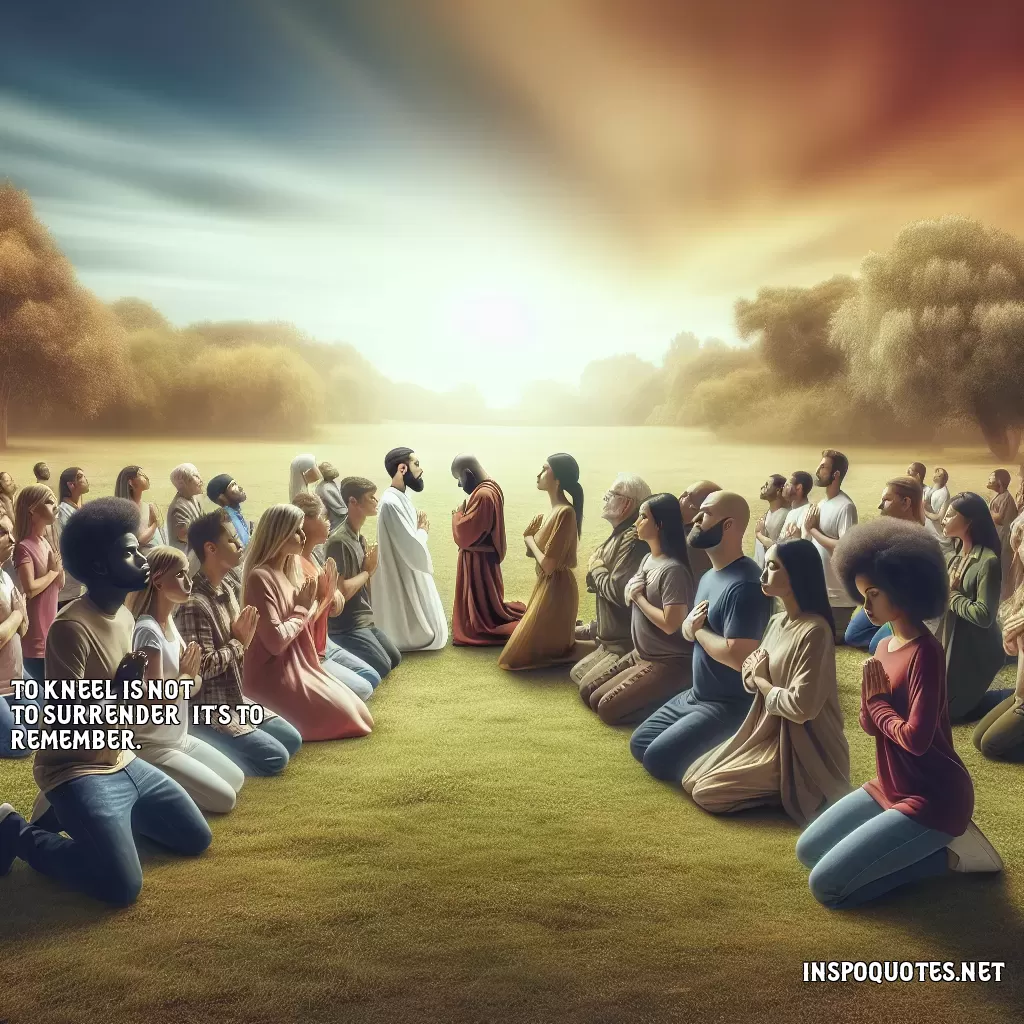
To kneel is not to surrender it's to remember.
Author: Kae Tempest
👁️ 9 views
The quote "To kneel is not to surrender, it's to remember" can be interpreted as an exploration of the symbolic act of kneeling beyond its common association with submission or defeat. Kneeling, in many cultures and traditions, is a multifaceted gesture that carries deep significance. It is often associated with prayer, humility, reverence, and respect. When one kneels, it does not necessarily mean conceding defeat or giving up one's autonomy, as the act of surrender would imply. Instead, kneeling can be a conscious, purposeful act of reflection, honor, or remembrance. It's about acknowledging something greater than oneself, whether that's a memory, a loss, a principle, or a hope. In a spiritual or religious sense, kneeling is an act of devotion and an expression of humility before a higher power. It is a physical posture that signifies an inner willingness to listen, to learn, and to open oneself to guidance. In social or political contexts, kneeling can be a form of protest or solidarity. For example, athletes or activists may kneel to remember and bring attention to social injustices and to demand change, highlighting that the act of kneeling is a reminder of the work that still needs to be done. Hence, the quote encourages us to view kneeling as an intentional gesture of memory and reflection, urging us to reconnect with our roots, beliefs, or collective memories. It challenges the simplistic notion of kneeling as mere capitulation, suggesting a deeper, more thoughtful engagement with the act itself.
Quote By: Kae Tempest
Kae Tempest, born on December 22, 1985, in Brockley, South London, is a British poet, playwright, and musician widely celebrated for their thought-provoking works that bridge genres and challenge societal norms. Tempest, who initially gained recognition through their poetry, has since carved out a multifaceted career that showcases their unique voice and perspective.
Tempest's journey into the world of performance began at an early age, influenced by the vibrant spoken-word scene in London. Their debut poetry collection, *Brand New Ancients*, published in 2013, received critical acclaim and won the Ted Hughes Award. This groundbreaking work weaves together modern lives with ancient myth, showcasing Tempest's ability to resonate contemporary experiences with rich, poetic imagery. Tempest's prowess as a wordsmith is matched by their dynamic stage presence, captivating audiences with performances that pulse with emotion and urgency.
In addition to poetry, Kae Tempest made significant strides in theater. Their play *Lisa’s Case*, released in 2015, depicts the struggles of identity and belonging, and their follow-up piece, *Paradise*, earned nominations for prestigious awards, solidifying Tempest's status as a leading voice in contemporary drama. Tempest’s works often grapple with themes of social justice, mental health, and the human experience, inviting audience members to engage with the deeper issues that shape society.
Tempest is also known for their musical endeavors. Their album *Let Them Eat Chaos*, released in 2017, fuses spoken word with hip-hop elements, and features compelling narratives that reflect on personal and societal challenges. The album received widespread praise and was nominated for the Mercury Prize, further establishing Kae Tempest as an artist of remarkable versatility.
Through their varied contributions to literature, theater, and music, Kae Tempest continues to inspire and provoke thought. Their unique blend of artistry invites audiences to reflect on the complexities of life in the modern world, making them a pivotal figure in contemporary literature and performance. As they embark on new projects, Kae Tempest remains a powerful voice for the often unheard, reminding us of the transformative power of words and storytelling.